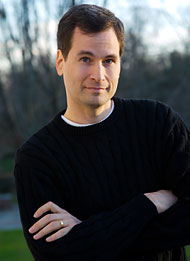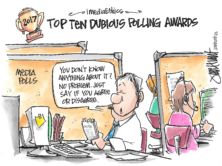
David Pogue, shown above, "is the personal-technology columnist for The New York Times" according to his NY Times bio.
Though this isn’t the first time the NYTPicker has criticized New York Times freelance writer David Pogue, recent exchanges seem to be uniquely heated.
The Picker, a daily blog devoted “exclusively to the goings-on inside the New York Times,” argued in a recent post that Pogue gets special treatment—not having to conform to conduct rules that other freelancers were recently let go over. Pogue then responded in the Picker’s comments section, defending himself, and the blog responded in a new post.
Like a semantical seesaw, Pogue has again responded to the new post in the blog’s comments section. Pogue says his talks to companies conform to New York Times rules. NYTPicker says they don’t. And the argument reveals the complexity and ethical nuance of issues of conflict of interest. Let’s try and unpack the arguments a little here:
In their first post (about a number of freelancers let go from the Times over conflict of interest policy violations) the NYTPicker wrote that Pogue “frequently accepts free plane tickets and accommodations from corporations the NY Times covers.” (Link is original to NYTPicker).
They argue Pogue is a more valuable asset to the paper, writing “That may have something to do with the fact that while Albo and Tripsas have lost their jobs, Pogue continues to keep his gig while traveling the country — courtesy of corporations who pay him to speak at retreats and confabs, identifying himself as a NYT columnist.”
In the comments section, Pogue defends himself by claiming that out of 30 speaking engagements, only one was for a corporation. “It was Raytheon. And that was an engagement that had been individually approved by my editors,” he writes, continuing, “the remaining 29 were for educational and non-profit outfits.”
After another commenter points out that some of the other companies the Times writer has spoken to are in fact for-profit corporations (eCollege, for example), Pogue responds in a second comment that the Times’ policy is only that reporters must avoid relationships with companies that they have written about or will write about. “Raytheon is fine–I have never written about Raytheon, and never will “ he writes. “All those training and educational outfits I listed are fine, too. I don’t write about them, and won’t write about them.
A key point in Pogue’s favor, is that, as he explains, the Times has given him case-by-case approval for speaking engagements that might otherwise conflict with the paper’s policy for reporters. In that sense, he hasn’t broken the rules, as he’s been given a special dispensation for certain engagements. He also doesn’t accept money for speaking engagements with for-profit companies, according to comments.
At the same time, The NYTPicker makes a good point, that these dispensations themselves may constitute a favoritism toward Pogue, if he’s routinely allowed to attend events that would otherwise break the rules, like another they cite:
Staff members should not accept invitations from outside our company to speak where their function is to attract customers to an event primarily intended as profit-making.
In their second post, NYTPicker points out that Pogue hasn’t revealed the bulk of the New York Times’ rules, and that beyond not writing about companies they’ve spoken to, reporters must also not accept compensation or travel money from any for-profit company, regardless of whether they might write about it.
Pogue defends himself in yet another comment, arguing that his upcoming appearances at corporate events like MacWorld will be entirely unpaid. He does not, however address whether he received any money for his appearances at Raytheon (or eCollege), which the NYTPicker alleges may have been paid.
It’s a thorny issue. It looks like Pogue is probably following the rules in a concrete sense, but all of this raises the question about how and why a paper like the New York Times decides to suspend the rules meant to keep reporters from conflict of interest in some specific cases, but perhaps not others.







Comments Terms and Conditions